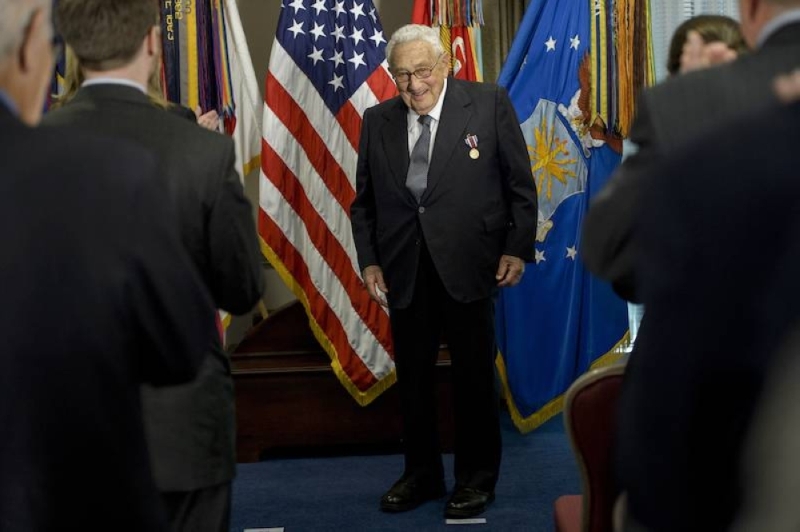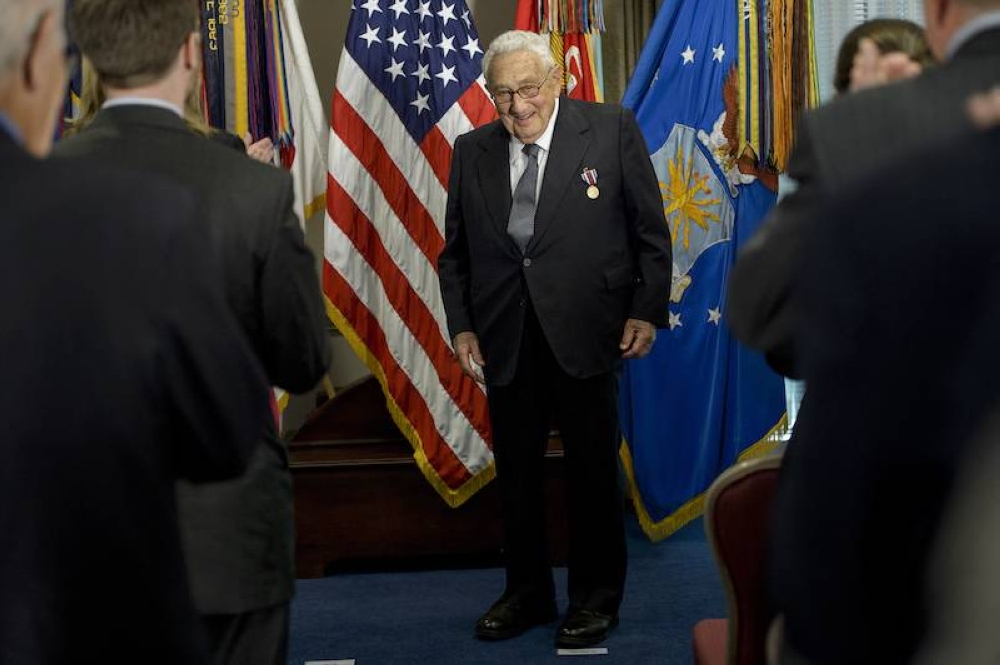
Former Under Secretary of State Henry Kissinger during a memorial service at the Pentagon in 2016. / AFP
Former US Secretary of State Henry Kissinger, who turns 100 on Saturday, remains in the spotlight of global diplomacy, sharing geopolitical advice and generating fascination and controversy as usual.
Recognizable to the visionary as a war criminal, Savant, recognizable by his hunched silhouette but thick-rimmed black glasses, continues to this day.
The former US Foreign Minister blew out the candles of a chocolate cake celebrating his 100th birthday as he attended a memorial service at select Economic Clubs in New York on Tuesday.
His public appearances have become rarer in recent years, but have become more frequent via videoconference, such as at the Davos meeting in January. But for Kissinger, who left his mark on American foreign policy in the late 20th century, his longevity is unusual.
From his New York office and consulting firm Kissinger Associates, he maintains a relative aura among elites in Washington and abroad, even among Democrats like former Secretary of State Hillary Clinton. “I trust their advice,” he said. “friend”.
– “Real Politics” –
A key role in Cold War world diplomacy, the Nobel Peace Prize laureate began rapprochement with Moscow and China in the 1970s with a realistic worldview akin to American-style “real politics.” .
In a sign that little has changed in the worldview, he told guests on Tuesday that the United States must defend its “vital interests.”
“We have to become stronger so that we can resist any pressure,” he said.
Also about the Ukrainian war, which he insists on a ceasefire. “We have reached the stage of achieving our strategic goal. Russia’s military attempt to absorb Ukraine has failed.”
But the image of the man with the raspy voice and strong accent that he inherited from his German roots remains tarnished, with his support for the 1973 coup in Chile and the invasion of East Timor, and the dark pages of American history. tied. And of course Vietnam.
“For me, there is no doubt that his policies have killed hundreds of thousands of people and destroyed democracy in several countries,” said human rights lawyer Reid Kalman Brody.
“I’m surprised he got away with it,” he said.
– bombing –
Indeed, Kissinger was never concerned with justice. In 2004 the lawsuit was dismissed.
The findings, published Wednesday on the website The Intercept, are based on archived Pentagon documents and testimony from survivors of the 1969-1973 U.S. bombing campaign in Cambodia for which Kissinger was responsible. are widely underestimated and claim to have killed more people than civilians. previously admitted.
Muntashir Mamoun, a historian at the University of Dhaka in Bangladesh, noted that Kissinger “actively supported genocide” in the country in 1971.
“I see no reason to praise Mr. Kissinger,” he said, adding that his views were shared by several countries, including Vietnam.
Carolyn Eisenberg, a historian at Hofstra University in the United States, said: “The irony is that we remember him making peace, but what he did to prolong the war not only in Vietnam but also in Cambodia and Laos. forgot everything,” he added.
– bloating –
Heinz Alfred Kissinger was born on May 27, 1923 in Fürth, Bavaria, Germany. He fled to the United States with his family at the age of 15 and became a naturalized American at the age of 20.
The son of a professor, he enlisted in the military’s counterintelligence unit and the United States Army, where he also served as a teacher, before embarking on an illustrious career at Harvard University.
Called to the White House in 1969 by Republican President Richard Nixon as National Security Advisor, he later established himself as the face of world diplomacy as Secretary of State (both positions held between 1973 and 1975). After that, he continued to be a powerhouse of diplomacy. Gerald Ford served as president until 1977.
It was at that moment that he made a secret visit to begin de-escalating tensions with the Soviet Union, repair Mao Zedong’s relations with China, and organize Nixon’s historic visit to Beijing in 1972.
He also undertook secret negotiations with Le Duc Tho to end the Vietnam War in parallel with the bombing of Hanoi.
He won one of the most controversial prizes in history, the Nobel Peace Prize, in 1973 for signing a ceasefire with North Vietnam.
Source: Diario.Elmundo


